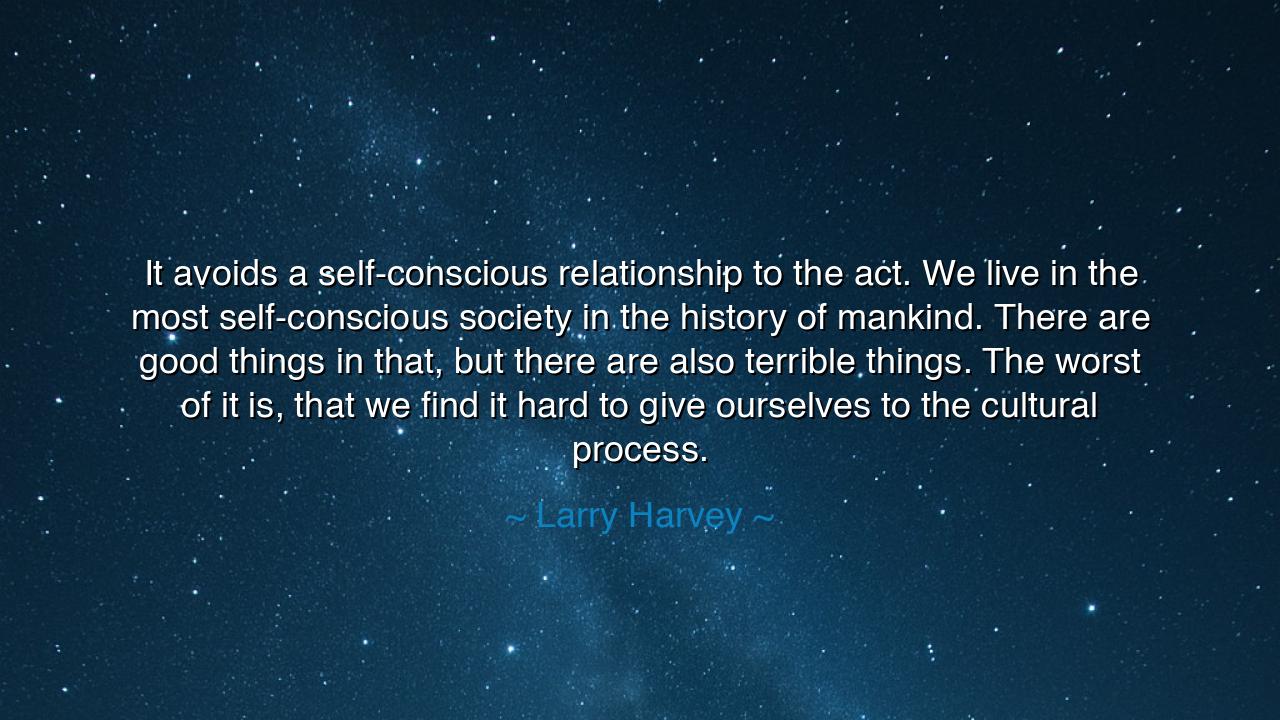
It avoids a self-conscious relationship to the act. We live in
It avoids a self-conscious relationship to the act. We live in the most self-conscious society in the history of mankind. There are good things in that, but there are also terrible things. The worst of it is, that we find it hard to give ourselves to the cultural process.






Hearken, O children of the ages, to the words of Larry Harvey, who speaks with the voice of discernment and reflection: “It avoids a self-conscious relationship to the act. We live in the most self-conscious society in the history of mankind. There are good things in that, but there are also terrible things. The worst of it is, that we find it hard to give ourselves to the cultural process.” Here lies the timeless teaching that the burdens of overthinking and scrutiny can sever the soul from the flow of creation, and that surrender to the moment is the gateway to true participation in life and culture.
In the chronicles of old, the elders observed that the heart’s freedom is diminished when the mind becomes a prison of judgment. To approach the act with self-consciousness is to fracture its purity, to tether intention to fear, doubt, or scrutiny. Harvey reminds us that while awareness brings reflection and insight, excess of it in the self-conscious society creates paralysis, preventing full engagement with the rites, rituals, and expressions that give life depth and meaning.
The origin of this wisdom is ancient, found in the practices of mystics, dancers, and artisans who taught that mastery is born in immersion, not in overthought deliberation. Across temples, amphitheaters, and sacred circles, the cultural process—whether music, ritual, or creation—demands surrender, allowing the spirit to flow unimpeded. Those who cling to self-consciousness may produce works, but they are hollow echoes; those who yield fully to the act become conduits of vitality and resonance.
O seekers, understand that to engage fully in life, art, or society requires shedding the weight of excessive awareness. To participate in the cultural process is to give oneself completely, trusting that the energy of creation will guide the act. Harvey teaches that the danger of our age is not the presence of thought itself, but the paralysis it produces, hindering the soul from merging with the rhythms of human expression.
Let this teaching endure, children of the future: honor the balance between awareness and surrender. Engage in the act with presence, not self-consciousness, and immerse yourself in the cultural process with courage and openness. Through such devotion, the spirit awakens, creativity flows, and the individual becomes a participant in the eternal dance of human culture, rather than a mere observer chained by scrutiny.
In this eternal truth, the mortal learns that freedom of spirit and depth of expression arise when one relinquishes the burden of self-consciousness. The relationship with the act is sacred, and the act of giving oneself fully to the cultural process transforms ordinary action into timeless resonance. By surrendering to the moment, the soul discovers joy, insight, and the power to leave a mark upon the world that transcends judgment and fear.
If you wish, I can also craft a more poetic, ceremonial version, where the act and the cultural process are depicted as sacred currents that flow through the soul when self-consciousness is set aside. Would you like me to do that?






GHLe Tran Gia Han
It’s so interesting that Harvey points out the drawbacks of living in such a self-conscious society. While being aware of ourselves can be beneficial, it can also prevent us from fully engaging in cultural experiences. Can we ever break free from this cycle of self-awareness, or is it a permanent feature of modern life? How do we foster environments that allow us to participate in cultural processes without fear of judgment?
DTHuynh Dinh Tam
This resonates with me because it highlights how much we’ve become trapped in the idea of being constantly aware of ourselves and others. The idea that it prevents us from giving ourselves fully to culture is powerful. How do we move beyond this hyper-awareness? Is it possible to simply act and create without constantly questioning ourselves? Maybe it’s a mindset shift we need to make.
BT37.Huynh Ngoc Bao Tram
Larry Harvey’s words really make me think about the tension between self-awareness and creativity. On one hand, being self-conscious has its benefits, but on the other hand, it can stifle creativity and engagement. Is it possible to navigate this balance? How can we embrace the cultural process without getting trapped in self-doubt or overthinking? This seems to be one of the greatest challenges in today’s world.
VNvuong Nguyen
It’s so true that we live in a hyper-self-conscious society, and I think it impacts the way we interact with culture. The pressure to be ‘perfect’ or to conform to certain standards can be paralyzing. How do we break free from that cycle and find joy in the process of creation or cultural expression? Can we truly contribute to culture if we’re always worried about the outcome?
QPnhu quynh pham
This idea of self-consciousness in society is spot on. I’ve noticed how even simple acts, like expressing creativity or engaging with culture, can feel burdensome when we’re constantly worried about how others will perceive us. Is this something we can change about ourselves, or is it a reflection of the times we live in? I wonder if we’ve lost the ability to just ‘be’ in the moment, free from judgment.